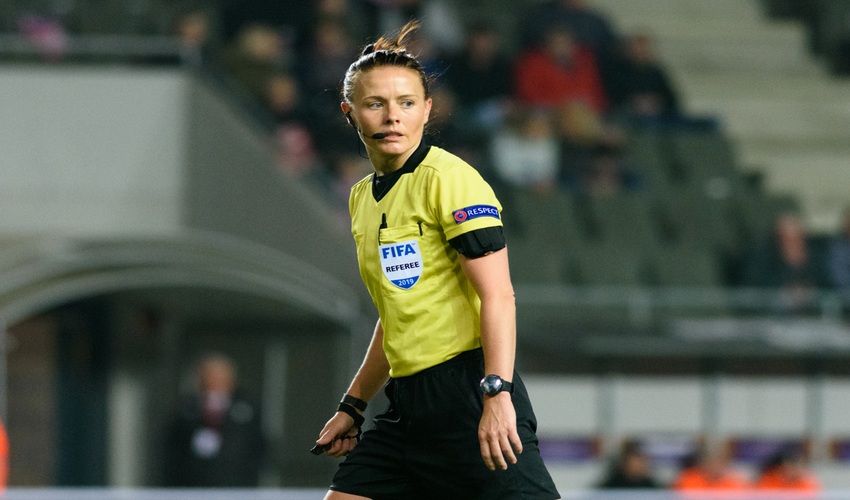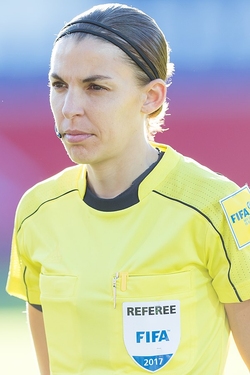The best kids may get trials at professional clubs and even end up training with and possibly playing for the youth team, but only a very few of them make it as a professional adult player, and even fewer ever play in the top tier, which is what most of them are aiming for.
There aren’t many kids running around park greens and school fields blowing a pretend whistle and brandishing pretend cards though.
No one grows up dreaming of becoming a referee – or do they?
Well someone must, because the Football Association lists around 80 professional referees and assistant referees, and by that we mean people for whom officiating Premier League and Championship matches is their full time occupation.
On top of that there are hundreds more working in the EFL, National League, and the leagues below, and there are a lot of tests to pass before you are allowed to do it too.
This means that there is no shortage of people wanting to try refereeing, so where do these folk come from, and what is the process they have to go through in order to blow that whistle and wield those cards?
Why Might Someone Want to Become a Referee?
 It’s a good question, and there are probably as many answers as there are referees.
It’s a good question, and there are probably as many answers as there are referees.
We can’t speak for them, but we can look at some of the qualities referees need to be successful, and come to our own conclusions from that.
A referee needs to be:
- Physically fit
- Calm under pressure
- Fair and unbiased
- Able to cope with stress
- Confident and have conviction in their decisions
- 100% clear on the rules of football, even the more obscure ones
- Able to focus intently for long periods
- Thick skinned
A sense of humour probably helps too – there’s a reason everybody liked Mike Dean.
Therefore, someone who likes a challenge, likes to look after themselves, is a bit of a stickler for details and who ranks fairness quite high in their list of personal values, would probably be a good fit.
It would help if they liked football too, of course.
Apart from suiting someone’s personality, there are other attractions to the job.
For one thing, if you can make it to the Select Group (more on that below) then the money can be very good indeed – much better than the average salary in the UK. We have written in more detail about the financial element here.
Referees also get to play a key role in very big games, so they rank highly in terms of importance when it comes to personnel. This must be appealing to the ego, to know that you have been entrusted with running some of the biggest games in football. Imagine being asked to ref the FA Cup Final – what an honour and what an achievement that must be for a ref.
Referees get an intimate behind the scenes view of a football team on matchday too, including working with some of the best athletes of the time, and all with a small team of other officials which must create a strong camaraderie.
It’s also a fairly unique job. You can be sure that you will be one of the most interesting people to talk to at a party if you officiate Premier League games and everyone else works in accounts, or runs a logistics company, or whatever.
Last but not least, the ref has the power. They would probably all deny it, but we bet some of them get a kick out of showing yellow and red cards to millionaire footballers. But only when the rules dictate they should do, of course.
Training to be a Professional Referee
Anyone can try to get involved in refereeing.
That said, there are a fair few different levels of referee, just like there are different levels of football, from non-league to the Premier League.
Only refs at a certain level can officiate in the top leagues, so there is a training and promotion system in place that is there to help new referees build experience and progress to, hopefully, taking the reigns in a top tier football match.
Afterall, it’s quite a leap from refereeing The Nags Head Rovers v All Saints Church Utd on a park green, to officiating Arsenal v Chelsea in the FA Cup final at Wembley.
There are 10 different levels of referee as you can see in the table below:
| Tier | Status | Leagues Officiate |
|---|---|---|
| International | FIFA List | Split into Elite Group, First Group, Second Group & Third Group |
| Select Group | Professional Referee | Premier League (Referee Only) |
| Select Group 2 | Professional Referee | EFL Championship (Referee Only) |
| Level 1 | National List | EFL League 1 & 2 (Referee Only) |
| Level 2a | Panel List | National League (full), Football League (Assistant referee) or Premier League (Select Group Assistant Referee) |
| Level 2b | National League North and National League South (full), National League (Assistant referee) or Football League (Assistant referee) or Premier League (Select Group Assistant Referee) | |
| Level 3 | Contributory Referees, National League North and National League South (Assistant Referee) or National League (Assistant referee) or Football League (Assistant referee) or Premier League (Select Group Assistant Referee) | |
| Level 4 | Supply League Referees, Contributory League Assistant Referee | |
| Level 5 | Senior County Referees, Supply League Assistant Referee | |
| Level 6 | County Referees, Supply League Assistant Referee | |
| Level 7 | Junior Referees, Supply League Assistant Referee | |
| Level Y(8) | Youth Referee | |
| Level 9 | Trainee Referee | |
| Level 10 | Declared non-active Referees (back garden referee) |
That bottom level is for those who are perhaps qualified but have stepped back, are on a long term break, or have retired, so for our purposes the bottom rung of the ladder is Level 9 – the trainee ref.
It all starts by registering with your local county football association (CFA) and undertaking the basic refereeing course. You need to pass each module and demonstrate a thorough understanding of the ref’s job pre-match, during the match, and post match, and once passed you will need to ref 5 games at county level, with support from your CFA.
After these are complete, you are officially a referee and will be sent a certificate to prove it as well as your FA Referee Badge.
This isn’t a particularly long process, about 12 hours of study, and even those under the age of 16 can attempt to complete it, but going forward age restrictions may apply. For instance, the ref in question will either be a Level 7 or Level Y depending on their age.
From this point on it is a case of building experience and then, when the person in question feels ready, applying for promotion.
How Referees Get Promoted
Refs must make their own applications, a promotion will not be given out to them unless they request it, and all promotions up to and including Level 5 are handled by the local CFA.
The main body of the FA itself only gets involved from Level 4 onwards.
Of course, applying for promotion does not mean promotion will definitely happen. Referees must work a minimum of 20 open age (adult) games in a single season, have at least 12 months experience at their current level, receive a set number of observation reports (so their performance is watched and rated by others) and achieve certain marks in those reports for decision making etc., have completed all paperwork in a timely fashion, passed a further written examination, and more.
The bar is fairly high even at lower levels so that quality is maintained, and once refs try to climb higher in the ranks further obstacles are put in their way such as fitness tests and additional assistant ref appearances, plus attendance of professional development courses.
The higher the level the ref wants to achieve the harder it is to obtain, as you would expect, ensuring that only the most dedicated and best equipped make it through.
The requirement to complete at least one full season at each level also means that, however good you are, your progress is smoothed out so that even the best wonderkid referee in the world will have to have had a good 5 years’ worth of experience before getting anywhere near professional football, but the likelihood is that this timeframe from trainee to Level 4 and above would be longer.
Another method used to make the transition from a smaller league to a bigger one less daunting, is to allow refs to play other roles in games they wouldn’t be allowed to ref. For example they might work as the assistant in a game the level above where they are currently allowed to officiate, and equally, a newly promoted referee might be eased in gently with just a few games in charge during their first season, while taking other roles in their new league and also dipping back to officiate in the league below.
It’s all about maintaining standards, as well as protecting the refs who need to be supported to move at their own pace.
Female Football Referees

Everything we have described so far relates to the men’s football pathway, there is a slightly different structure for the women’s game.
However, this does not apply to the sex of the ref themselves, just the players, so men can ref women’s football and women can ref men’s football.
Interestingly, while men have been reffing women’s games forever, female referees only started to filter into the men’s professional game in the early 2020s, with Rebecca Welch making history in 2021 by becoming the first female referee in an EFL game, seeing over a meeting between Harrogate Town and Port Vale. Later, in 2022, she also became the first female to officiate a 3rd round FA Cup game, between Birmingham City and Plymouth Argyle.
She isn’t the first female ref to work in the men’s game in the UK overall though, that honour goes to Amy Fearn, who stepped in with 20 minutes to go when the original referee got calf strain. That was way back in 2010, but female officials had been kept mainly in assistant ref roles since then.
Wendy Toms was the first female ever to rise to become assistant ref in the top tiers of English football, but never actually took charge of a game outside of the conference.

However there is another person, a French lady called Stéphanie Frappart, who is the poster girl of female referees. She became the first female to take the reigns in a Ligue 1 game in 2019, the first female referee to officiate a Champions League game in 2020, and the first female World Cup referee in 2022.
Going back to Rebecca Welch though, she is probably a good case in point as to how someone might end up becoming a professional ref.
Rebecca took charge of her first football match in 2010, overseeing a university clash, but even as she progressed into league football she continued to work in her regular job for the NHS.
There just isn’t enough money in it to cover living costs at the bottom end of the scale.
She continued to ref as a ‘hobby’ until 2019, when she was finally able to earn enough as a referee to go full time. That’s almost ten years of graft, albeit with token payments along the way to sweeten the deal, before it paid off financially.
Of course, someone starting as a youngster would perhaps get to that point much sooner, but where you might see a wonderkid footballer in the starting 11 for a big club while still in his teens, you will never see a teenage ref taking charge in professional football.
This is ok though, since referees can officiate well into their forties and some even into their early 50s, so even if a ref turned professional at 30 – when most players are starting to consider life after football – they could have a solid 20 year career before they have to hang up their whistle.
We can probably all agree that a certain level of maturity is needed as a ref too, which is definitely not true of some players.